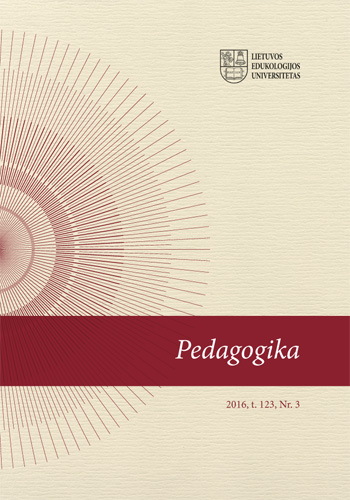Organizacinio tapatumo veiksnys ugdant kariūnų pilietiškumą: Generolo Jono Žemaičio Lietuvos karo akademijos atvejis
Organizational Identity Factor Educating Cadets’ Public Spirit: a Case of General Jonas Zemaitis Lithuanian Military Academy
Author(s): Rolanda Kazlauskaitė-MarkelienėSubject(s): Education, Military policy, Management and complex organizations, Sociology of Education
Published by: Vytauto Didžiojo Universitetas
Keywords: identity; organizational identity; collective identity; military; values; public spirit;
Summary/Abstract: This article deals with the phenomenon of military organization identity and its influence on the process of cadets’ public spirit education. The analysis of research data exposed the notion of public spirit between trainers and trainees that create common values for the formation of organization. The question of identity is actualized by the globalization, the increase of information and news, as well as migration. The result of changes is the changing human and social relations, and transformation of value systems. The factors effecting the construction of personal identity are revealed in the scientific literature. Identity is a conscious self-devotion to a specific group, which understands consequences. Organizational identity, on one hand, forms individual’s interests and value orientations. On the other hand, the individuals themselves construct personal and organizational identities. The creation processes of collective identity are derived from institutional, cultural and power context. The feature of collective identity is a person’s ability to define him/herself and others as ‘u’. Military identity, as a dimension of military organization, has undergone not one transformation. The basis of forming military identity is a consciously constructed value system. Duty, responsibility, discipline and loyalty are named as the priority of military values, which are recognized by the majority of members in the organization. Common values are the must in forming an organizational identity that is why the success of public spirit education in Lithuanian Military Academy depends on the interaction among cadets, military instructors and civilian faculty. The public spirit, as a dimension of organizational identity, reveals the forms of identities significant to Military Academy, namely responsibility, civil rights and duties, social participation, loyalty and tolerance. These forms partially suit to the applied public behavior model of five dimensions in organization, which includes the aspects of support, honesty, public interaction, tolerance and respect. Preparing cadets, future officers of Lithuanian military, it is obligatory to recognize dual organizational identity of Military Academy and orientate to the active public spirit educating in all aspects, taking into consideration the basic idea of national security, which praises the responsibility for the complete and secure future of our nation and state.
Journal: Pedagogika
- Issue Year: 123/2016
- Issue No: 3
- Page Range: 23-35
- Page Count: 13
- Language: Lithuanian

